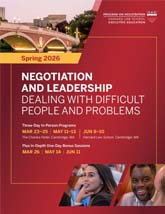
Adapted from “Negotiating with the Green-eyed Monster,” first published in the Negotiation newsletter.
Envy can cause us to engage in deception at the bargaining table. That’s the cautionary finding of recent research by Simone Moran of Ben-Gurion University in Israel and Maurice E. Schweitzer of the Wharton School at the University of Pennsylvania.
In one experiment, Israeli university students provided the experimenters with background information about their personal achievements, academic performance, and scores on entrance exams. The students were then given the background information of a nonexistent “counterpart,” whom they were told was sitting in a nearby room. Some students were led to believe their counterpart was a high achiever, while others were led to expect an average achiever.
Next, all the students were given a sum of money and asked to divide it between themselves and their counterpart (whom they were still unaware was fictitious). They were told the counterpart could choose between accepting the offer, in which case the money would be divided accordingly, and refusing it, in which case neither party would receive any money at all.
In a twist on this “ultimatum game,” the students were told that the counterpart didn’t know exactly how much money was being divided, a “fact” that created an opportunity for deception. As an example, an unethical but strategic negotiator given $40 in such a game might offer $10 after telling her counterpart she has only $20, knowing most people would consider this an acceptable allocation. By contrast, an “honest” offer of $10 out of $40 might very well be rejected, leaving both sides with nothing.
Overall, about half the students lied to claim a bigger slice of the pie. Those who thought they were facing high achievers were more likely to lie than those who thought they were facing low achievers. Participants who told lies exaggerated the size of the pie by similar amounts.
Why might negotiators be more likely to lie to someone they envy? Pointing to research linking envy to schadenfreude, the phenomenon of taking pleasure in the suffering of others, Moran and Schweitzer suggest we may experience a psychological lift from harming those we envy—and justify poor treatment of those who “deserve to be taken down a notch.” Here are three ways to head off the deception that envy can inspire:
1. Brag with caution. When meeting new counterparts, it’s often desirable to tout your achievements—but beware the risk of triggering destructive envy. To head off a counterpart’s deception, work on building trust and rapport before getting down to business.
2. Audit your feelings. Your envy of a counterpart could cause you to justify behavior that you would normally avoid. If you’re tempted to lie to someone, consider whether irrational envy could be to blame.
3. Anticipate a backlash. Understanding that envy is a powerful motivator, many organizations pit their salespeople against one another for performance rewards. When setting up such competitions, factor in the possibility that envy toward winners could lead to later problems.



